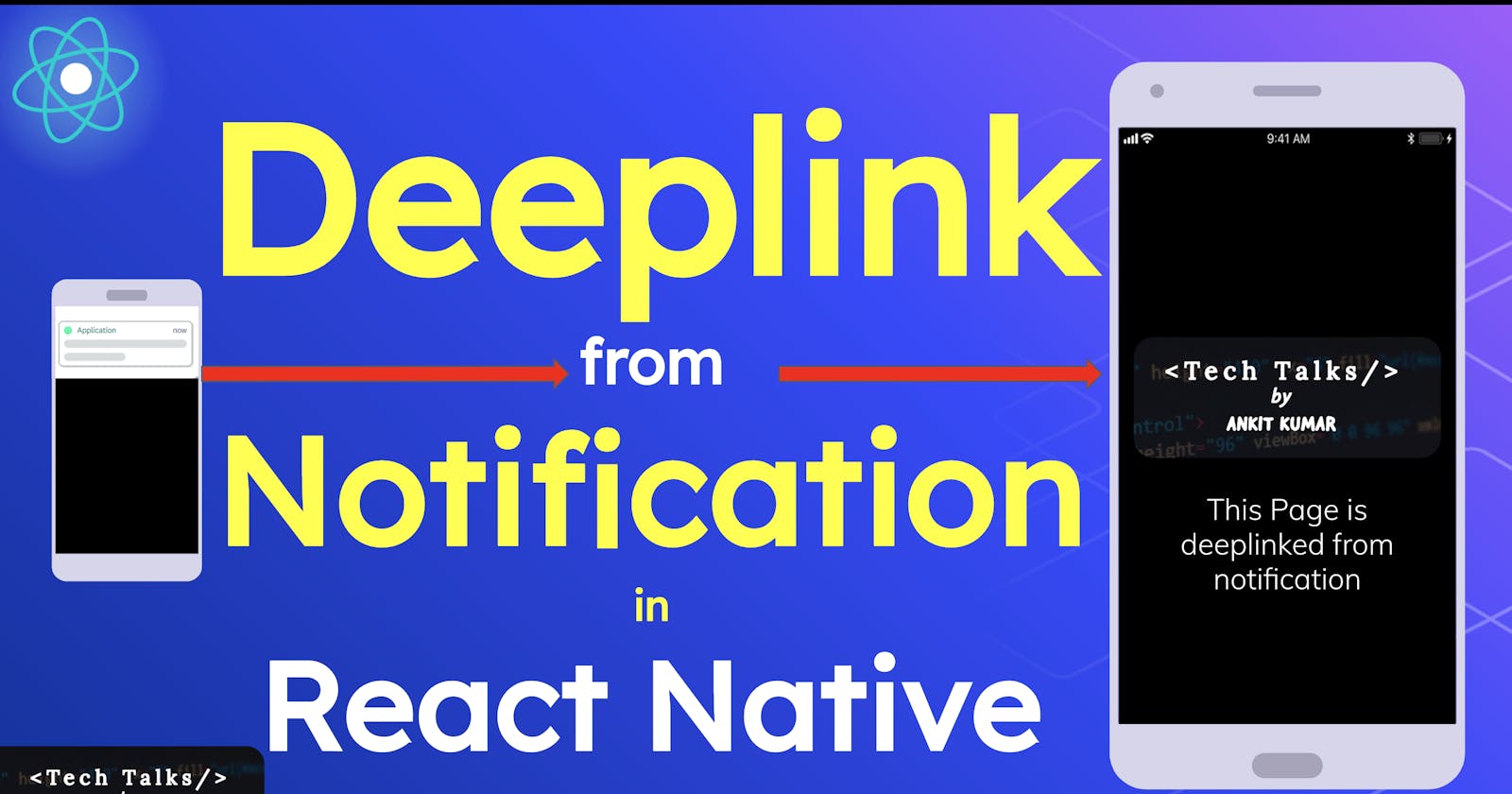Deep linking is when a link sends users directly into a specific point in the app experience, rather than an external website or app homepage.
Originally posted at ankitkumar.dev
If you have missed an article on How to implement deep linking in React Native app with React Navigation v5, go through it first.
What are we building today?
In the last article, we learned about how to implement deep-links in the react native app with react-navigation v5.
In this article, we will look at how to deep-link content in the app from the notification.
We will use the below deep links and see how the app behaves when this deep link is received in the notification and the user tap on the notification.
demo://app/home/:id- This deep link will open thehomescreen of the app and will passidas param/props to thehomescreendemo://app/profile/:id- This deep link will open theprofilescreen of the app and will passidas param/props to theprofilescreendemo://app/notifications- This deep link will open thenotificationsscreen of the appdemo://app/settings- This deep link will open thesettingsscreen of the app
After the implementation of the deep link with notification, the app will behave as shown here.
Let’s do some code now!
Setting up the project
I am assuming that you already have a project in which deep links need to be integrated.
If you don’t have any project, I have created a small app with four screens and explained it here.
Setting up the notification in the project
Project is already created in the previous article
I have set up four kinds of local notification in the app
Schedule local notification without the deep link
const scheduleLocalNotification = () => { PushNotificationIOS.scheduleLocalNotification({ alertBody: "Scheduled Local Notification", fireDate: new Date(new Date().valueOf() + 2000).toISOString(), }); };Local notification that deep-link to profile
const sendProfilNotification = () => {
PushNotificationIOS.presentLocalNotification({
alertTitle: "Deep link to profile",
alertBody: "demo://app/profile/234",
applicationIconBadgeNumber: 1,
});
};
Local notification that deep-link to settings screen
const sendSettingsNotificationWithSound = () => { PushNotificationIOS.addNotificationRequest({ id: "notificationWithSound", title: "Notification Deep link", subtitle: "Received Deep link", body: "demo://app/settings", sound: "customSound.wav", badge: 1, }); };Local Notification Request that deep-link to the notifications screen
const addNotificationRequest = () => { PushNotificationIOS.addNotificationRequest({ id: "test", title: "deep link", subtitle: "Open notifications", body: "demo://app/notifications", category: "test", threadId: "thread-id", fireDate: new Date(new Date().valueOf() + 2000), repeats: true, }); };
Lets now write functions to handle registering to and unregistering from notification
We will just console log device token on successful registration
const onRegistered = (deviceToken) => {
console.log("Registered For Remote Push", `Device Token: ${deviceToken}`);
};
and console log error message on registration error, if any
const onRegistrationError = (error) => {
console.log(`Error (${error.code}): ${error.message}`);
};
Adding/Removing event listeners on useEffect Hook
Add below code to your app for adding and removing event listeners
useEffect(() => {
PushNotificationIOS.addEventListener("register", onRegistered);
PushNotificationIOS.addEventListener(
"registrationError",
onRegistrationError
);
PushNotificationIOS.requestPermissions().then(
(data) => {
console.log("PushNotificationIOS.requestPermissions", data);
},
(data) => {
console.log("PushNotificationIOS.requestPermissions failed", data);
}
);
return () => {
PushNotificationIOS.removeEventListener("register");
PushNotificationIOS.removeEventListener("registrationError");
PushNotificationIOS.removeEventListener("notification");
PushNotificationIOS.removeEventListener("localNotification");
};
}, []);
Handling onClick of notifcation
Lets now create a function to handle onclick event of notification
const onLocalNotification = (notification) => {
const isClicked = notification.getData().userInteraction === 1;
// Handle deeplink here from notification - done below
};
We need to add onLocalNotification() to event listeners, so the updated event lister will look like below.
useEffect(() => {
PushNotificationIOS.addEventListener("register", onRegistered);
PushNotificationIOS.addEventListener(
"registrationError",
onRegistrationError
);
PushNotificationIOS.addEventListener(
"localNotification",
onLocalNotification
); // Handling click on notification
PushNotificationIOS.requestPermissions().then(
(data) => {
console.log("PushNotificationIOS.requestPermissions", data);
},
(data) => {
console.log("PushNotificationIOS.requestPermissions failed", data);
}
);
return () => {
PushNotificationIOS.removeEventListener("register");
PushNotificationIOS.removeEventListener("registrationError");
PushNotificationIOS.removeEventListener("notification");
PushNotificationIOS.removeEventListener("localNotification");
};
}, []);
Let's do magic now
Import Linking from react-native on top of the file.
Modify onLocalNotification() method as below
const onLocalNotification = (notification) => {
const isClicked = notification.getData().userInteraction === 1;
Linking.openURL(notification.getMessage());
};
We are done with the coding part
It was easy, wasn't it?
Testing deep-link from the notification
Video of testing
Full source code can be found on Github Repo
This content is also available as video on YouTube
Further Reading
Also, to be notified about my new articles and stories:
Subscribe to my YouTube Channel
Follow me on Medium, Github, and Twitter.
You can find me on LinkedIn as well.
I am quite active on Dev Community as well and write small topics over there.
Cheers!!! Happy coding!!
